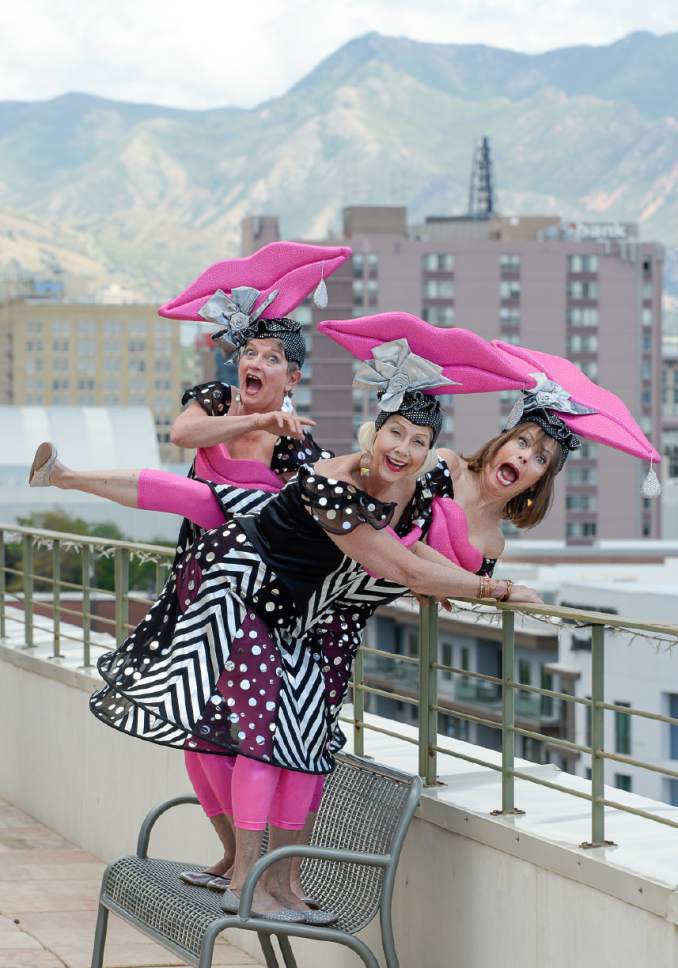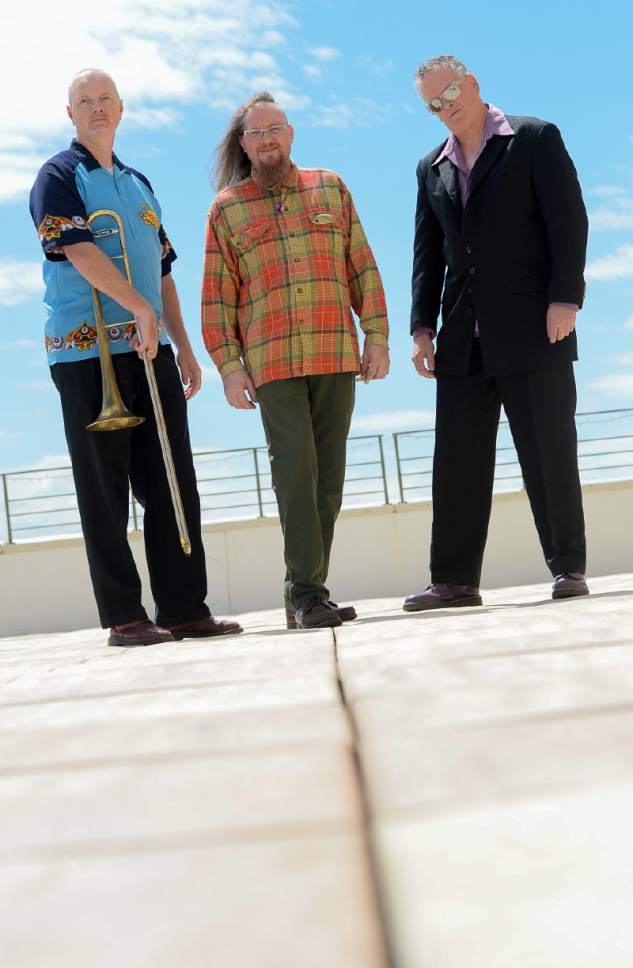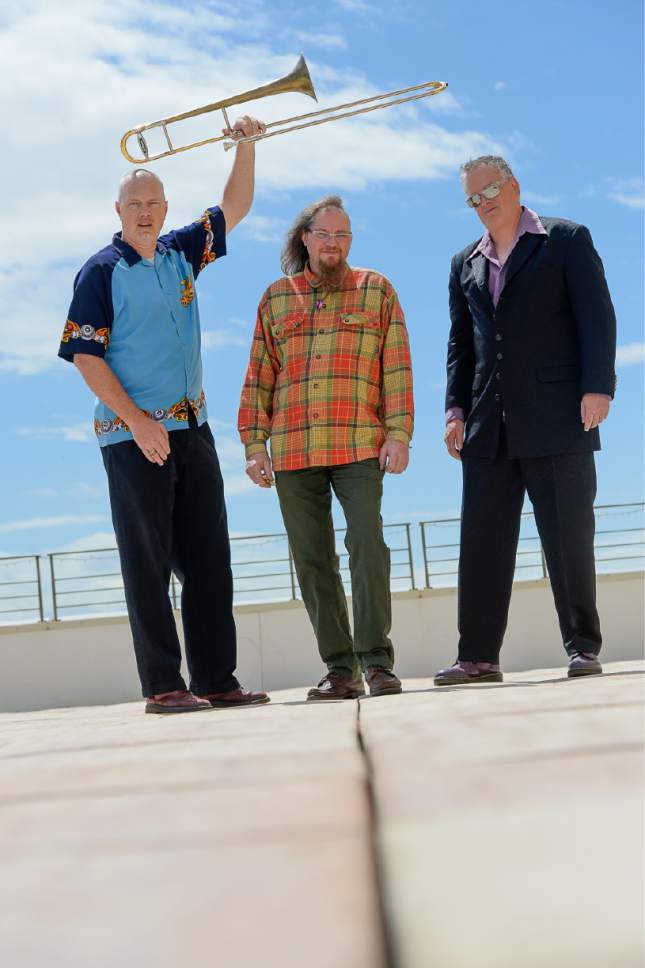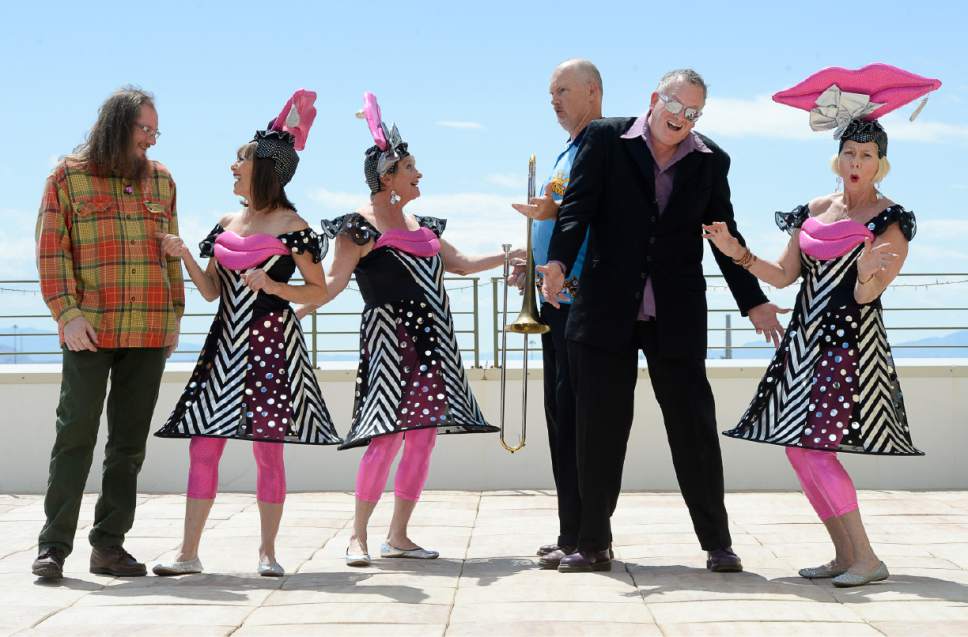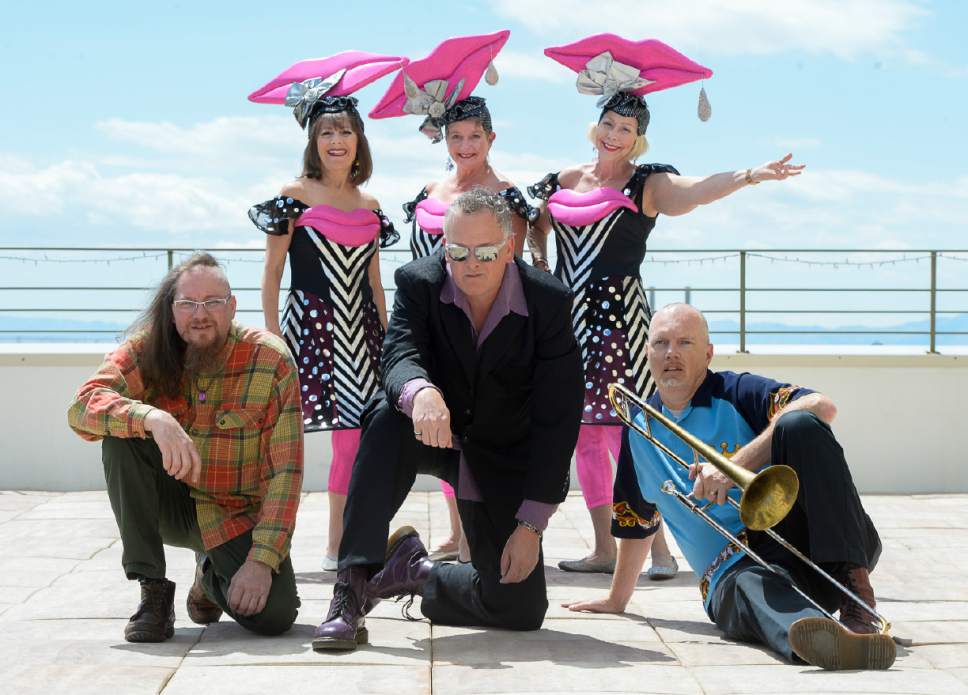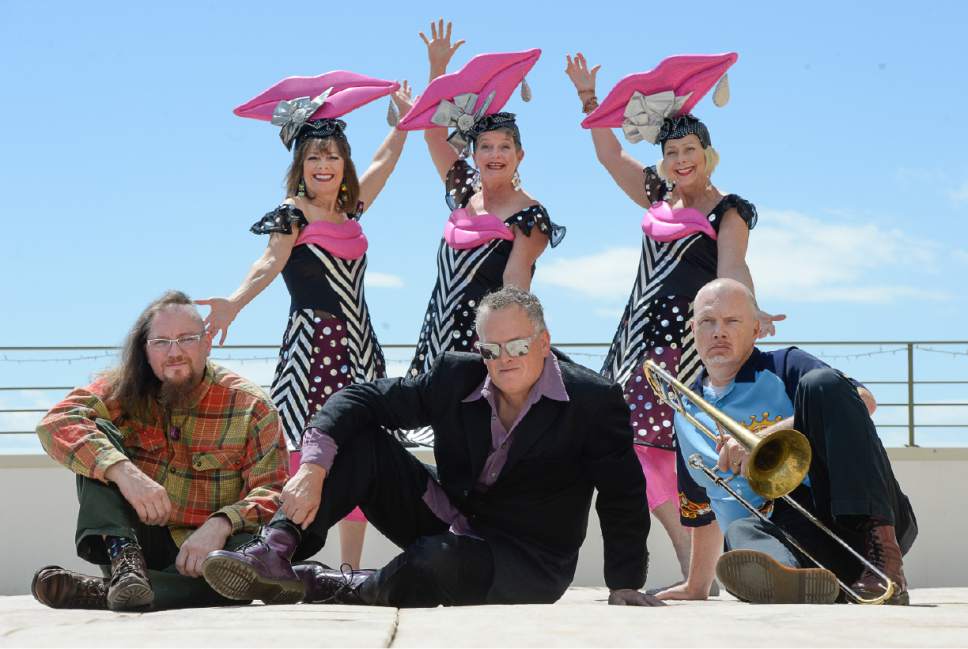This is an archived article that was published on sltrib.com in 2017, and information in the article may be outdated. It is provided only for personal research purposes and may not be reprinted.
Few musical acts in Utah can match the Saliva Sisters or Insatiable for longevity, or for the smiles their performances plaster on their audiences' faces.
"We've gotten progressively funnier, and we've gotten progressively unemployable," joked Becky Heal, aka Uvula, one-third of the parody-singing Saliva Sisters.
"I'm just lucky to have a band that still digs it," said Jeff Evans, founder, keyboardist and vocalist of the ska band Insatiable.
Performances by the two acts will bookend the 41st annual Utah Arts Festival, running this coming weekend in Salt Lake City's Library Square. The Saliva Sisters will play the festival stage at 9:45 p.m. Thursday, while Insatiable will close out the weekend by headlining the Amphitheater Stage next Sunday night.
The two Utah acts take their place among top-class national headliners, including outlaw-country icon Shooter Jennings, Cuban drummer Pedrito Martinez, bluegrass/Americana band Fruition, R&B/blues singer Nikki J. Crawford, bluesmen Jarekus Singleton and Dexter Allen, and electronica producer RJD2.
—
Harmony and camp • The Saliva Sisters have been performing since 1980, just after the first Utah Arts Festival was organized on Salt Lake City's Main Street in 1979.
"The arts festival started it," said Michelle Nunley, alias Levolor, the one founding member still in the trio. Nunley, Leslie Perry Howa and Kristen Merrill were all vocalists who worked with other local bands who had played the festival.
"We just wanted to sing harmony," said Nunley. (The trio also have a fictional origin story, which they recount in concert; it starts "growing up in the Time and Eternity Trailer Park.")
Heal was singing with the Joe Muscolino Band, and heard about the Saliva Sisters. "I was jealous," she said. "I wanted to be a Saliva Sister." Not long after, Howa left the group, and Heal got her wish.
The trio "started out as a camp group," Heal said, as evidenced by their matching spangly dresses and drooling-lips headdresses.
The need for parody songs, Nunley said, resulted from their early success: They kept getting booked at The Sun, one of Salt Lake City's early gay bars, and they required new material.
The first parody number they did was a "terrorist medley," in which they dressed like armed gunmen and sang "I Shot the Pontiff" (a riff on Bob Marley's "I Shot the Sheriff").
"That's when [terrorism] was all brand new, and we thought it was funny," Nunley said.
Fors credited much of the Saliva Sisters' humor to Merrill, known as Byla, who died in 2011. "She was such a wordsmith and a great wit," said Fors, who joined the trio after Merrill's death, taking the stage name Salubria.
A lot of the repertoire, like "Shelley Winters Thighs" (to the tune of Kim Carnes' "Bette Davis Eyes"), find humor in the aging process. Many of the trio's songs are about living in Utah, with titles such as "Do You Know the Way to Willard Bay?" and "Just as Good as Colorado Now" (both from their 1999 album "Delusion of Granger").
"We've had people call us, and tell us in person, that they were ready to leave Utah until they saw the Saliva Sisters," Heal said.
The key criteria for a Saliva Sisters song, Nunley said, is "hopefully something that makes them laugh."
—
On tour and coming home • At first, creating a ska band was just a matter of being practical for Jeff Evans.
Evans played saxophone in the band at Murray High School. "I wanted to put together my own band, but I needed to put together a band that had horns in it."
The high-school band fizzled, but in 1991, while at the University of Utah, Evans tried again to form Insatiable, posting flyers around Gardner Hall seeking musicians to audition.
"I ended up having much better horn players than me, so I moved to full-time keyboards," he said.
Evans stuck with ska, the fast-moving Jamaican style of music that was a precursor to reggae, because "it's upbeat, it's happy," he said. "We write about some dark topics. But even when you're talking about a dark topic, when you put it to a ska groove, it still sounds happy. Ska music could make a song about a car accident sound fun."
In the early to mid-'90s, Utah was a major scene for ska bands. Bands like Swim Herschel Swim and Stretch Armstrong came up from Provo and Brigham Young University, and national acts coming through Salt Lake City would sometimes sleep on Evans' living-room floor.
Insatiable toured regionally and even nationally, with the band's biggest tour in 1994. The band even got a distribution deal. "Going into a Tower Records in New Jersey and finding your album is kind of cool," Evans said.
The seven-man band kept going, he said, "until we started having babies. … It was a decision: Either we keep on keeping on, and that means being away from home for months at a time, or we dial it down and start families. We went for choice two."
The core of the band — Evans, bassist Scott Terry, guitarist Zach Craigle and sax player Lou Lodefink go back to '91, and trombonist Reed Chadwick and trumpeter Chris Taylor joined a few years after — have performed at least once a year since the mid-2000s. (The band's drummer, Thomas Sienko, is a recent arrival. "It's fun to have a millennial perspective in the band," Evans joked.)
Now that the kids are grown up, Evans said the band may get together more often.
"I can definitely see us, in Salt Lake, playing once a quarter," he said. "I want all of our shows to be a special event. The days of us playing a three-hour bar show are probably behind us."
—
From Olympics to the festival • As Utah musical stalwarts, Insatiable and the Saliva Sisters have bumped into each other from time to time.
Members of both bands fondly recall in 2002, when Salt Lake City hosted the Winter Olympics, the gigs were plentiful. They wound up performing at the same party, thrown by then-Mayor Rocky Anderson outside the City-County Building, freezing their behinds off in the February snow.
The Utah Arts Festival is familiar territory for both acts. The Saliva Sisters have played there every other year for the past few years, while Insatiable last performed on the Amphitheatre Stage in 2010.
The Saliva Sisters recalled pulling some nutty stunts at the arts festival. When Salt Lake City introduced new garbage cans, the Salivas made their entrance by being wheeled onto the stage in three bins.
When Heal and the Joe Muscolino Band played in 1979, the festival's first year, she performed from the back of a flatbed truck. A former festival director was tickled by that idea, put the Saliva Sisters on a flatbed and drove it around the Utah State Fairpark.
"This is art — it's thrilling," Heal said of the festival.
The festival, Evans said, is "a unique vibe in the Salt Lake arts and music scene that you can't find it anywhere else. … It's a good showcase for local artists."
Twitter: @moviecricket —
2017 Utah Arts Festival
The 41st Utah Arts Festival, featuring music, visual arts, film, spoken word, dance, street performances, children's activities, workshops and more.
Where • Library Square and Washington Square, 200 West and 400 South, Salt Lake City.
When • Thursday through Sunday, June 22-25
Hours • Noon to 11 p.m. each day
Tickets • $10 for adults on Thursday, $12 for adults Friday, Saturday and Sunday; $35 for a four-day festival pass. Children 12 and younger get in free; members of the military and people over 65, $6. Other discounts and presale offers are also available at uaf.org.


